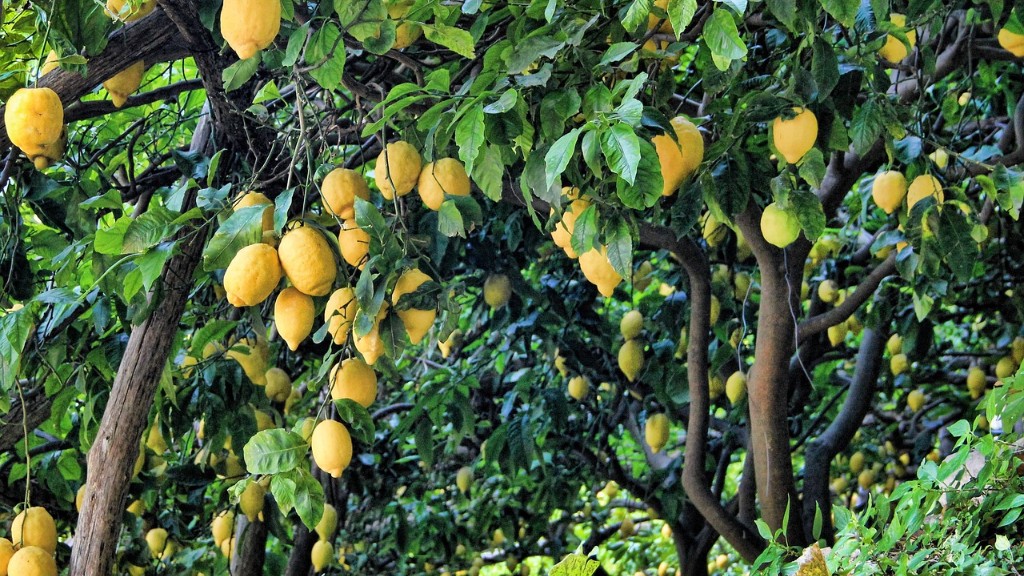It is possible to help a lemon tree grow and get the most out of its lifetime with proper preparation and care. Here are a few tips and tricks to get the most out of your lemon tree:
Firstly, make sure the lemon tree is planted in an area that gets adequate sunlight for six to eight hours per day. Not only will this help the lemon tree to thrive, but it will also help it to bear plenty of sweet and juicy lemons.
Secondly, provide your lemon tree with plenty of water. This can be done by checking soil moisture regularly and providing deeper, more lengthy waterings when the soil is dry. Lemon trees are not fond of frequent, shallow waterings and this can be damaging to the lemon tree’s health.
Thirdly, fertilizer is a good idea when growing a lemon tree. Make sure to use the right fertilizer, as too much nitrogen can cause major issues. A citrus fertilizer will help the tree bloom and help keep pests away.
Fourthly, pruning is also important to helping a lemon tree reach its full capacity. Prune the lemon tree to improve fruit production and to keep the tree healthy. Prune the lemon tree in late winter when frost danger has passed.
Lastly, controlling pests and diseases is also important to a lemon tree’s health. Make sure to keep an eye out for any pests or diseases that could be damaging to the tree, and treat them accordingly.
Caring for a Lemon Tree
Caring for a lemon tree is essential if one wants to get the most out of it. Firstly, make sure that area of the lemon tree receives adequate sunlight for six to eight hours a day to encourage optimal growth. Secondly, water the lemon tree regularly, deeply and infrequently so that the soil can get adequately moist. Thirdly, fertilize a lemon tree as needed with the right fertilizer to stimulate flowering and protect against pest attacks. Fourthly, prune the tree in late winter after frost has passed to improve fruit production. Lastly, pay attention to any signs of pest or disease problems and treat them immediately.
Add A Structural Support
Structural supports, such as stakes and trellises, can help a lemon tree grow and reach its full potential. These must be used appropriately to give the tree the necessary support while it grows. Firstly, stakes should be placed firmly into the ground and stake the tree with enough space for growth. Secondly, if using trellis, make sure to attach it securely to stakes that are well rooted in the soil. Thirdly, a strong base of well drained soil should be used to support the lemon tree. Finally, make sure to consider the size of the lemon tree before attaching any structures.
Cleaning and Pruning
Cleaning and pruning are essential to encourage optimal growth of a lemon tree. Firstly, remove any old and diseased branches to help the tree prevent disease and combat pests. This is best done in late winter and early spring. Secondly, remove any debris or weeds around the tree that may be taking up nutrients and interfere with the tree’s growth. Thirdly, any dead or damaged branches should be trimmed in order to encourage optimal growth. Lastly, keep the tree well pruned in order to increase the yield and improve the quality of the fruit.
Managing Pest and Diseases
Managing pest and diseases is key to the success of a lemon tree. Firstly, monitor the tree regularly for signs of pests or diseases, and take action accordingly. For example, if there are signs of citrus leaf miners, use an appropriate insecticide to remove them. Secondly, keep a close eye on the tree for any signs of aphids and spider mites, which should be treated with specific insecticides. Thirdly, if there are signs of fungal diseases, treat them with the appropriate fungicides. Finally, keep the tree healthy to reduce the risk of pests and diseases.
The Importance of Mulching
Mulching is an important part of helping a lemon tree thrive. Mulch should be added around the tree to control weeds and keep the soil moist, which is helpful for the tree’s growth. Firstly, mulch acts as a protective layer, protecting the tree from extreme temperatures and helping to keep the soil moist. Secondly, mulch helps to increase organic matter in the soil and helps to keep the pH balanced. Thirdly, mulch also helps to reduce the need for frequent waterings. Finally, a thick layer of mulch helps to prevent weeds from getting too close to the tree.


